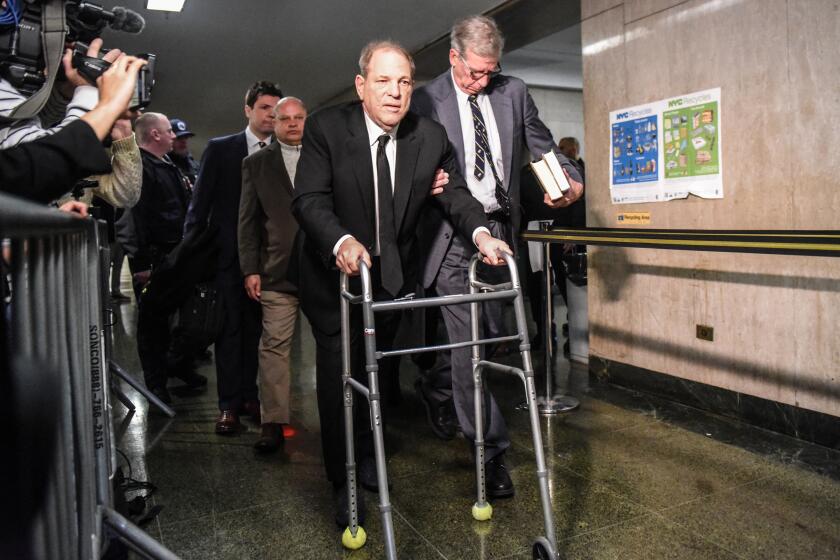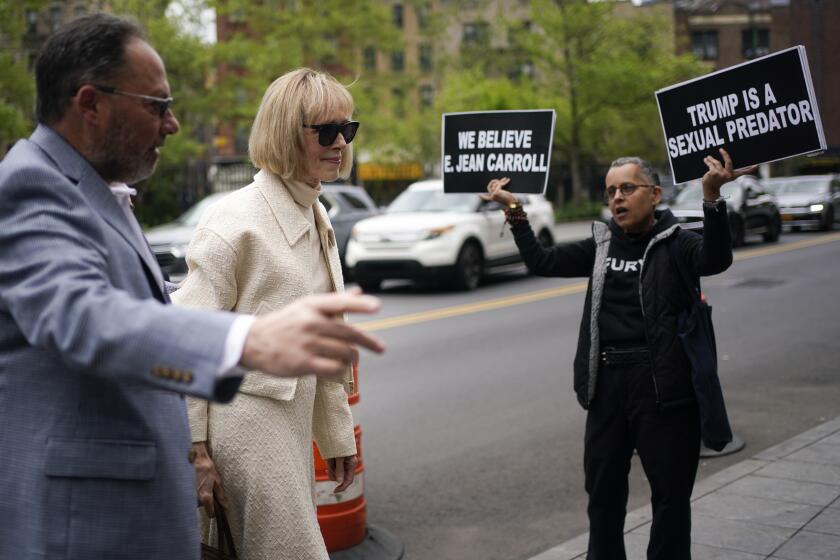Editorial: Reversal of Harvey Weinstein’s conviction is disappointing, but a fair justice system is important

There’s no question that Harvey Weinstein was a sexual predator who assaulted and threatened scores of women, according to their accounts documented by journalists, during his years as a powerful and tyrannical Hollywood producer.
Since 2017, the allegations of more than 100 women whose lives were shaken and scarred by his deeds upended not just the entertainment industry but all workplaces, boosting the #MeToo movement and an overdue examination of sexual misconduct and abuse of power in society. Weinstein was convicted of sexual assault by courts in New York and Los Angeles.
The overturning of his conviction in New York’s highest court Thursday is a shock to all who thought justice had been fairly handed down. Although it’s some solace to know that Weinstein still faces a 16-year jail sentence in California. But this latest court action doesn’t change who he is.
The guilty verdict for Harvey Weinstein is important for the #MeToo movement and for victims of sexual assault everywhere.
However, leaving in place a conviction after a trial was found to have been conducted unfairly is very much something that would change who we are — a society with a legal system that applies the law equally to everyone, guilty and innocent.
Weinstein was convicted in 2020 of committing a criminal sexual act and third-degree rape in New York and sentenced to 23 years in prison. In a 4-3 decision, the state Court of Appeals found that the trial judge should not have allowed testimony by four women whose allegations of assault by Weinstein were not previously proved in court or among the charges in the case. The inclusion of the witnesses could have had an improper effect on the jurors judging Weinstein, the appeals court found.
Harvey Weinstein accusers and others in Hollywood have condemned a New York appeals court’s decision to reverse the disgraced producer’s rape conviction.
Although Weinstein’s attorneys have said they will appeal their client’s 2022 conviction for rape in Los Angeles on the same grounds, it may be a tougher case to make. For one thing, California does allow prosecutors to introduce unproven allegationsof previous sex crimes for limited purposes if a defendant is on trial for a sex crime. In addition to the women who testified about the allegations that Weinstein was charged with in Los Angeles, four women were called to testify about uncharged acts of sexual assault by Weinstein in places other than L.A.
Sexual assault cases can be difficult. Victims are sometimes reluctant to come forward or do so after the statute of limitations on the crimes has run. So, it’s frustrating to see what is widely seen as an unfair outcome in a case against someone repeatedly accused of horrendous acts thrown out.
To hear E. Jean Carroll’s testify against Donald Trump on a witness stand with the world listening is a powerful example of the #MeToo movement’s lasting ripple effects on our culture.
And let’s face it — this is a horrible blow for those brave enough to come forward to testify about alleged disgusting and brutal attacks by Weinstein. (He has denied that he has assaulted anyone. In his L.A. trial, his attorney said there were “transactional” sexual relations with two of his accusers.)
If this conviction is tainted, then the state of New York has no choice but to start over or accept defeat. That’s for prosecutors to decide. We shouldn’t think of this disappointing court decision as favoring a man who is already convicted of rape in Los Angeles and completely disgraced. It’s a move to protect our justice system from corruption and ensure that it works fairly for everyone.
More to Read
A cure for the common opinion
Get thought-provoking perspectives with our weekly newsletter.
You may occasionally receive promotional content from the Los Angeles Times.












